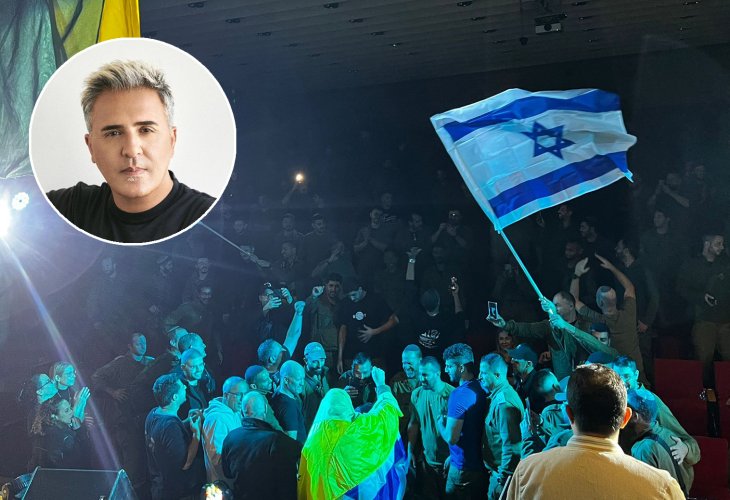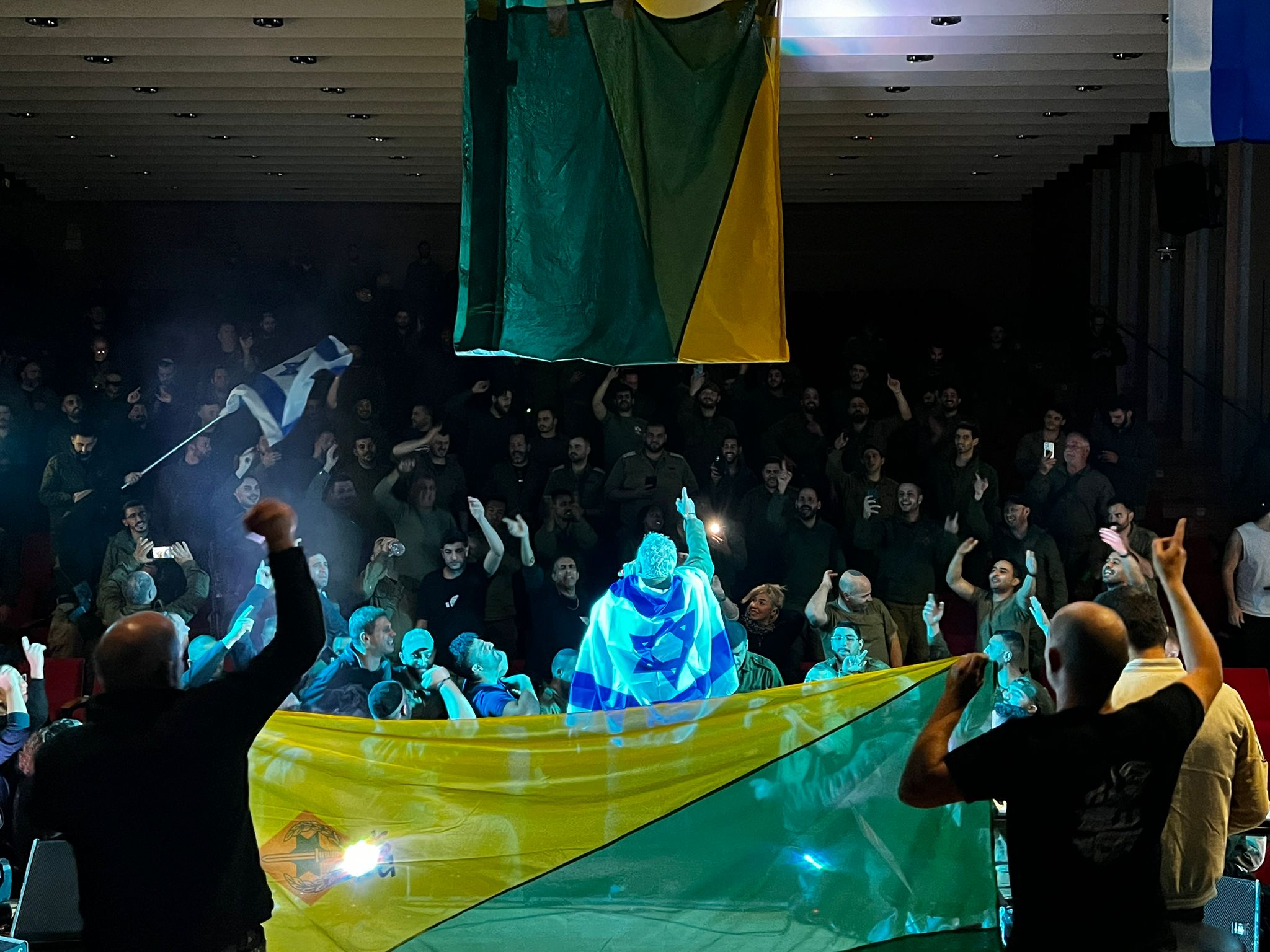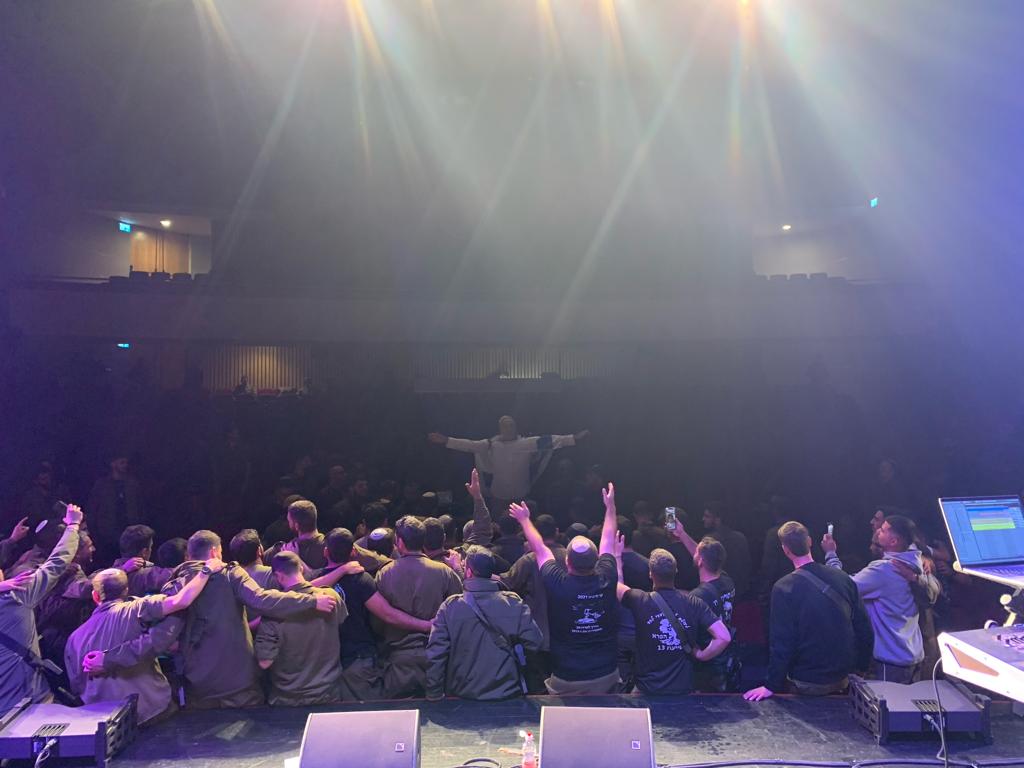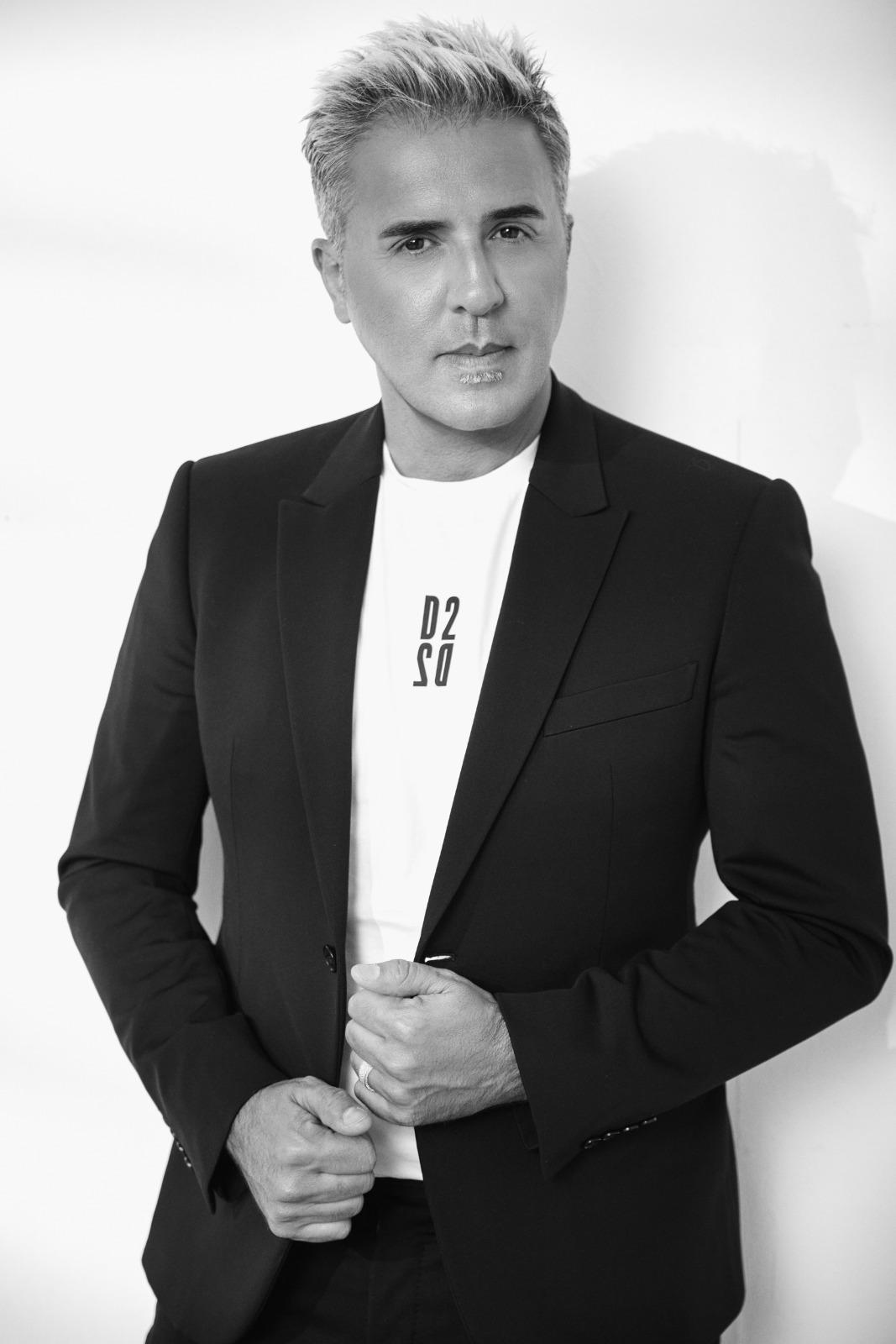Kobi Peretz: "The Families of the Hostages Cried Out Their Prayers from the Depths of Their Souls, and I Broke Down and Cried with Them"
Kobi Peretz, one of Israel's renowned artists, talks to Hidabroot about his performances for soldiers during wartime, the moment that led him to wear a *tzitzit*, and a decision he made regarding his online posts.
 In the circle: Kobi Peretz (Photo: Lior Kason)
In the circle: Kobi Peretz (Photo: Lior Kason)A few months ago, the Peretz family, with their four children, left their home in northern Tel Aviv and moved to Ra'anana. Their new home is pleasant and welcoming, and their hospitality is very generous. I was curious to know why they left one of the most sought-after areas in Israel. "We've undergone some changes in recent years," says Kobi. "Today, thank G-d, the children study in religious frameworks, which was relatively complex in Tel Aviv. In Ra'anana, there are more and simpler options in this regard, and that was our main consideration."
"Although we felt a great sense of mission in Tel Aviv, partly thanks to the Hidabroot leaflet featured in synagogues there, in the overall calculation it seemed like the right move for us. There are special and righteous Chabad followers in northern Tel Aviv who will continue the mission there, and we truly trust that with Hashem's help they will succeed. One of those emissaries we were connected to is Rabbi Ido Halevy from Chabad Tel Aviv, a righteous and G-d-fearing man whom I love very much, a sweet Jew whom I couldn't believe the insults he was willing to endure for his mission."
"For example, when he would go out to offer people the opportunity to put on *tefillin*, there were people who would shout and spit on him. He would tell those who attacked him that it is every Jew's right to put on *tefillin* and that he wasn't forcing anyone but merely offering them gifts, but it didn't help much. Many times after hearing about these unfortunate incidents, I would ask him where exactly it happened, and I would insist on placing a permanent *tefillin* stand right there. I would organize a stand, approach one of the local businessmen and ask if he would be willing to take it out and bring it in. There's still much work in this field, and it's very challenging, but with eternity, one does not fear a long journey."

The Gates of Tears Are Never Closed
In normal times, Kobi Peretz fills giant halls and performs all over the country, but since the outbreak of the war, the nature of his shows has changed dramatically. "Like all of Israel, I was shocked in the first few days, but thank G-d, I quickly channeled the pain into empowering action. In the last two months, I performed, and am still performing, dozens of times for soldiers all over the country, with significant emphasis on making the performance very empowering and connected to Torah and mitzvot."
"Among other things, thank G-d, until now I've had the merit to distribute more than a thousand *tzitzit* in my performances to soldiers who took upon themselves to wear a *tzitzit*. My son Liel Gabriel told me seven years ago that he wants a *tzitzit* like his cousin, my brother's son, and that he wants me to wear a *tzitzit* too. No rabbi managed to convince me to wear a *tzitzit*, but if my son wants something like that, how can I say no? I also wanted to be an example for him. And so, from that day on, I wear a *tzitzit*, and I believe and feel that the *tzitzit* protects me and my family. I also try as much as possible to wear the *tzitzit* outside so people can see and maybe be strengthened by it too."
Speaking of empowerment, videos from your performances for soldiers in the last two months have strengthened many people and often brought them to tears.
"Sanctifying Hashem's name in performances is really the main thing for me. Rabbi Arush once told me that it doesn't matter how many lessons he gives—I, as a singer, can influence more than a hundred rabbis. Some of the videos I upload from performances in which I do Kabbalat Ol Malchut Shamayim have one and a half million views; these are simply crazy numbers. After the Torah, which is holy of holies, there is, in my opinion, music. King David played and sang; in the Temple, they sang and played, and this has a very important place in Judaism."

"Since I can remember, I've had a special love for soldiers. I see a soldier as someone who sacrifices himself for the people of Israel. A few days after the war began, when I was asked to perform at the bases, I immediately agreed, and it hasn't stopped since. After a few performances, a dear Jew from Ashkelon approached me and said, 'There are many soldiers who want to put on *tefillin* but don't have any. I have six pairs that I want to donate. I see you perform a lot for soldiers. Take them and say during the performance that whoever takes upon himself to wear *tefillin* will receive a new and elegant pair now.'"
"That's exactly what I did, and those six pairs disappeared in no time. If I had two hundred more, I could have distributed them within minutes. Suddenly, you see soldiers who have never put on *tefillin*, or haven't since their bar mitzvah, suddenly want so much to put on *tefillin*. After that performance, I realized the immense demand for *tefillin*, and I dove deep into it myself. I raised funds from donors in Israel and abroad, connected with several scribes, and together with a guy named Shalom Orenuno, the son of Rabbi David Abuhatzeira's gabbai, we embarked on the great *tefillin* distribution operation. To date, I've raised money for more than 500 pairs of *tefillin*, and I distribute them in performances."
"I have performed in large venues many times in my life, and in some of my performances, we made history. But if I were to add up all the certificates, achievements, and awards I’ve received in my life—they are nothing compared to what has happened to me in the last two months with the soldiers. In every performance, I do Kabbalat Ol Malchut Shamayim, distribute *tefillin* and *tzitzit*, sing chapters from Tehillim with them, and generally perform kiddush Hashem and merit the public. After such performances, I come home with a full soul. I feel so rich in those moments that even Jeff Bezos and Bill Gates seem poor beside me."
"Additionally, I can also share about a special performance I had for the families of the hostages. Very well-known artists performed next to me, and before I went on stage, one of the family members said to me, 'None of the artists who performed before you mentioned Hashem, we would be very happy if you could mention Him. It's really important to us.' At that moment, I decided to have Kabbalat Ol Malchut Shamayim with them, and I told them that we must cry out together to Hashem to save us and bring the hostages home. Immediately afterward, everyone stood up, and together we cried out: 'Shema Yisrael,' 'Hashem Melech, Hashem Malach, Hashem Yimloch Leolam Va'ed,' and then 'Ana Hashem Hoshia Na,' etc. The families of the hostages cried out the prayer from the depths of their souls, and I broke down and cried with them. Prayer, especially one that comes with tears and from the depths of the heart, can pierce all the heavens."
Walking with Hashem
Beyond Peretz's performances, he also uses his influence on social media for the sake of positive messages he believes in. "One of the most important things I write about is the issue of unity. I am sure that a large part of the reason this calamity happened, and continues to happen to us, is because of the division and hatred among us that have intensified in the last year. If we are united, no one can defeat us. Hashem wants to see us united, and if we are not, He tries to bring us back there."
 (Photo: Lior Kason)
(Photo: Lior Kason)"The terrorists, may their name be erased, who were captured alive, said in their interrogations that they saw the demonstrations and calls for refusal of orders, and it encouraged and motivated them to act against us. They felt we were divided and weak, and it fueled them. Therefore, I also call on all the people who continue to demonstrate—to stop immediately. The terrorists want to destroy all of us; they don't care if you're right or left, pro-reform or anti-reform. There are times when it's appropriate, but now it really harms the nation's cohesion and war efforts."
"And speaking of social media, I’ll say that many times after I wrote various posts—the media would criticize me. I wasn't so moved by it, but it still affected me somehow. We tried to find favor in the eyes of the media, in the eyes of the world, but recently I decided not to try anymore to find favor in anyone's eyes if it goes against my people or our soldiers. I walk only with Hashem, say what I truly want to say, and don't think twice. Since I emerged from the darkness, from captivity, I've resolved to only sanctify Hashem's name, encourage the public, perform mitzvot and acts of kindness for the people of Israel, especially for the soldiers and all who love Hashem. This is my great mission, and I pray to Hashem to give me the strength to continue doing it throughout my life."

